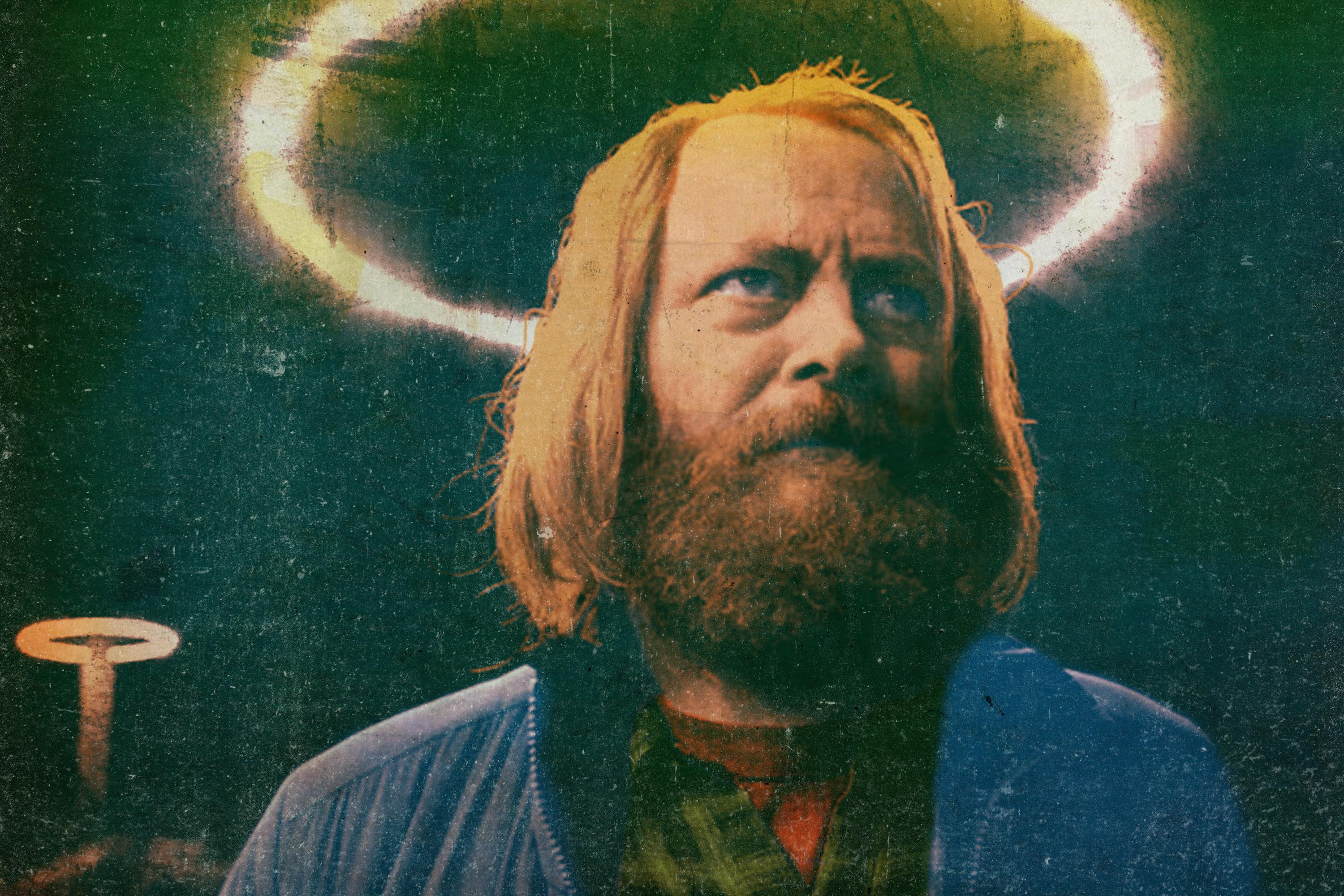
Nick Offerman has a weird way of casting a spell over you. Lots of charismatic comedic performers will feed off the energy in a room, but Offerman uses his unmistakable baritone, gruff masculinity, and deadpan delivery to make you meet him on his level—pulling you into a space where you can only think about his utterance of every syllable. I got to see Offerman perform a stand-up set when I was in college, and I haven’t felt a similar kind of energy since. Whether it was his vibe or the audience-wide deference to the dude who’s basically Ron Swanson in real life, the auditorium was eerily silent as Offerman delivered an anecdote that wasn’t even particularly funny. Are we even watching stand-up? I thought, a couple of times.
But then—I still remember this clear as day—as Offerman was talking about his wife Megan Mullally and started getting into some very intimate details about manscaping and their extremely active sex life, he let out a disarming giggle. (If you’ve never heard Offerman giggle, it’s unexpectedly bubbly and delightful.) Everyone in the room followed suit, like he’d given us all permission to breathe. Offerman is funny, but much more impressive than his punch lines is his ability to command a room—or a television audience.
Offerman’s powers have been used mostly for good: on comedies like Parks and Rec; on a stand-up tour; in self-help books; in instructional videos about best woodworking practices. But what if Offerman’s charms weren’t used as a positive force; what if he was basically running a cult?
Writer-director Alex Garland’s decision to cast Offerman in his creepy sci-fi miniseries, Devs, as the closest thing the show has to an antagonist has been alarmingly effective. In the series, Offerman plays Forest, the enigmatic CEO of a Silicon Valley tech company, Amaya, that specializes in things like quantum physics, encryption, and artificial intelligence. Forest couldn’t be more different from Ron Swanson, the character Offerman is practically synonymous with: he’s got unkempt hair, eats undressed arugula by the handful in board meetings, and drives a foreign car. (An old Subaru Forester; I’ll assume the wordplay was intentional.) Really, the only thing the two characters might have in common is distaste for the government.
Forest is a familiar kind of Silicon Valley CEO—the type who refers to his company’s space as a “campus” and creates an environment that encourages its workers to never leave the office. Of course, most employees seem cool with this arrangement because they regard him as a messiah of sorts. If your next thought is, “Well, that sounds potentially nefarious,” Devs is way ahead of you. You need to get through only half of the series premiere to understand that Forest’s ambitions, specifically as they pertain to the company’s secretive work in the Devs department, make him both terrifyingly unstable and dangerous.
On the first day that an artificial intelligence coder Sergei (played by Karl Glusman) joins the Devs team and learns what they’re working on, he has a panic attack, vomits in the bathroom, and tries to steal some of the project’s code. Rather than reprimand his employee or issue a warning, Forest has him killed. Sergei’s death is preceded by another spellbinding Offerman monologue, where the character cooly lays out his worldview that everything in life is predetermined. What’s so disturbing isn’t the lack of remorse, but Forest’s earnest belief that nothing—Sergei’s betrayal, his own part in the death—could’ve prevented this from happening. I never thought I’d be scared of Nick Offerman, but the way his character confronts Sergei and watches his head of security suffocate the poor guy with a plastic bag is chilling. It should go without saying that the less you have in common with Gus Fring when it comes to workplace disputes, the better.
Devs is, at least by the midway point of the series, an unsettling exploration of determinism and whether free will exists, something that fits into Garland’s career-spanning interest in the human condition and how we’re often our own worst enemy. Forest doesn’t believe humans have free will and that we’re all running on invisible “tram lines.” As Sergei’s girlfriend, fellow Amaya employee Lily (Sonoya Mizuno), investigates the circumstances around her boyfriend’s mysterious death—Forest frames it as a suicide—it seems like we’re on a (predetermined?) collision course between employer and employee.
As for the Devs work itself, we can infer that Forest is trying to create and perfect a predictive algorithm for humanity—something so accurate it can effectively function like a window into any point in the past or future. (Historical events seen through the prism of the algorithm thus far: Jesus on the cross and Arthur Miller having sex with Marilyn Monroe. Devs is a wild show.) Forest’s chief motivation is finding a way to reunite with his late daughter Amaya, whose likeness sits on the campus in the form of a giant, surreal AF statue.
Amaya (the daughter, not the company) shades every aspect of Offerman’s performance and his character’s underlying pathos. Forest is doing sinister things—upon firing another employee from the Devs team, he all but threatens to have them killed if they breathe a word of what they’ve been working on—but is driven by the familiar, human pain of grief. The Devs project is Forest’s way of channeling that grief into something unprecedented: the potential to bring back a loved one with an assist from quantum physics. It’s a lot more nuanced than Garland having Offerman play a parasitic Silicon Valley leader with zero redeeming qualities.
While Offerman isn’t known for dramatic roles, it’s his ability to command your attention and put you in a trance-like state—even when he’s playing someone who isn’t remotely likable—that makes Forest’s command over his employees seem so authentic. The people working on the Devs team genuinely believe in their work and seem willing to do anything for Forest’s approval; you get the feeling that most of them, if asked by their CEO, would jump off a cliff without hesitation. It takes a talented actor to make sure that effect doesn’t feel campy or performative, and Offerman’s natural charisma dialed into something so unsettling brings out a versatility we haven’t seen before.
It can be hard for comedic actors to seamlessly pivot into more dramatic work—give Bob Odenkirk an Emmy for Better Call Saul—but it’s harder still for some performers to move on from a role that’s defined them. (Will Jon Hamm never not be Don Draper?) Forest certainly won’t capture the zeitgeist like Ron Swanson, and perhaps nothing Offerman does in his career will ever compare to his portrayal of television’s most iconic libertarian. But Offerman’s performance in Devs proves our guy contains multitudes, and that sometimes when he delivers a monologue that totally captures our attention, there doesn’t need to be a punch line or a giggle to follow it.

